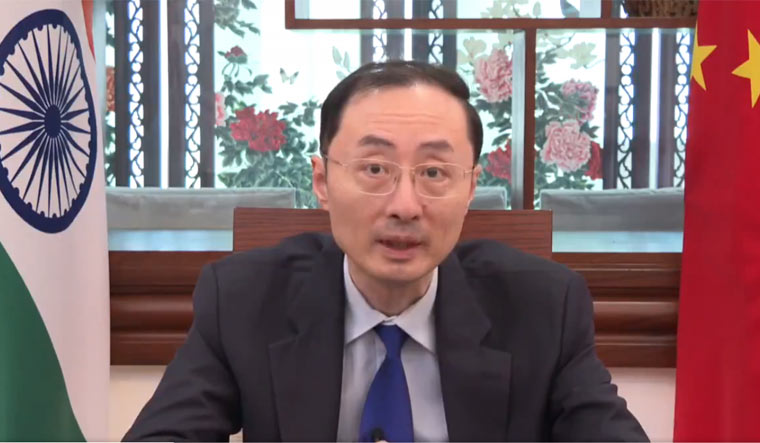Chinese Ambassador to India Sun Weidong has a formula to bring the bilateral relations between the two countries back on track: “implement consensus reached by the special representatives, focus friendship, defuse suspicion and properly handle differences and sensitive issues.’’
In a video message on Friday, Sun Weidong chose to shift focus from the boundary issue and invoke friendship between China and India in history.
“At the backdrop of what recently happened at the Galwan Valley, some quarters in India raise doubts about the consensus reached by the two leaders, and have wrong perception of the direction of China-India relations,’’ he said. “These have brought disruptions to the bilateral relationship…. China and India should be partners, rather than rivals.”
This is the first clear signal—beyond the de-escalation on the border—that there will be a lowering of tensions. The way ahead will be diplomatic. In an almost 18-minute long video message, the Chinese envoy chose to talk about peace rather than confrontation.
“Cooperation benefits both while confrontation serves neither… We should always bear in mind the overall bilateral relations; put differences in an appropriate place and not allow differences to
interfere with bilateral relations,’’ he asserted.
The message is clear: China also wants the situation to be cooled down.
This is in contrast to the earlier Chinese messaging, which claimed that India had provoked the attack. While he did talk about China and sovereignty, his intended audience for this message was India. This is the first time that China’s messaging on India has been meant for an Indian audience and not to stoke Chinese nationalist sentiments.
The video message also chooses, subtly, to change the narrative away from the border dispute. The video was uploaded at the same time when the two sides were holding the 16th meeting of the Working Mechanism For Consultation and Coordination on India-China Border Affairs.
The virtual meeting is held at a joint secretary-level at the ministry of external affairs with the Chinese foreign ministry. Both sides “reaffirmed’’ that they will ensure “complete disengagement of the troops along the Line of Actual Control (LAC) and de-escalation in India-China border areas for full restoration of peace and tranquility’’, according to an MEA statement.
“They also agreed that for the overall development of bilateral relations it was essential to maintain enduring peace and tranquility in the border areas,’’ the statement read.
The Chinese envoy’s speech then sought to underline China’s intention to de-escalate.
The address makes it clear that the anti-China sentiment gaining ground in India has not gone unnoticed in Beijing. China wants to counter that.
The speech, therefore, focused on the cooperation between President Xi Jinping and Prime Minister Narendra Modi, the Wuhan Summit and the need for the two countries to come together.
Unlike the almost belligerent statements that had emerged out of the Chinese Foreign Office in the past one month, this was a serious attempt to douse the fire.
“I have noticed some emerging opinions in recent days which repudiate the essence of China-India friendship due to the border-related incidents, make false assumptions about China's
intentions, exaggerate conflicts and provoke confrontations, and regard a close neighbour over thousands of years as "enemies" and "strategic threats",’’ he said. “It is not the fact. It is harmful indeed, and not helpful.”
The ambassador also focused on the trading ties between India and China. At a time when India has chosen to ban 59 apps, focusing on the economic potential of both countries is interesting. It also suggests that India might have made the right move.
“China has been India's largest trading partner for many years in a row, with cumulative investment in India exceeding $8 billion US dollars,’’ he said.
“Some people have been trumpeting the so-called 'decoupling' of China-India economic and trade relations, with an attempt to completely exclude 'Made in China'. Any self-protection, non-tariff barriers and restrictive measures against China are unfair to Chinese enterprises, unfair to Indian employees who lost their jobs as a result, and unfair to Indian consumers who can not get access to the products and services they deserve. It will only harm others without benefit to oneself, and it will eventually hurt oneself as well.”
This measured address comes at a time when India has chosen to ramp up its air power and the rumours that India will finally invite Australia to the Malabar Exercise with Japan and the US to give the Quad a military dimension gather steam. It also comes at a time when America sent out two aircraft carriers to conduct drills in South China Sea to flex its muscles.
US Secretary of State Mike Pompeo earlier this week said that he had spoken to S. Jaishankar, minister of external affairs, several time to discuss the situation. “The Chinese took incredibly aggressive actions and Indians have done their best to respond to that,’’ he had said.
Also read
- Hopeful India, China will be able to restore peace at borders through bilateral engagement: PM
- 'Won't change reality': India slams Beijing's move to rename places in Arunachal
- India, China exchange views on complete disengagement, resolving remaining issues along LAC
- Despite India's strong rebuttal, China continues to harp on its claim over Arunachal Pradesh



